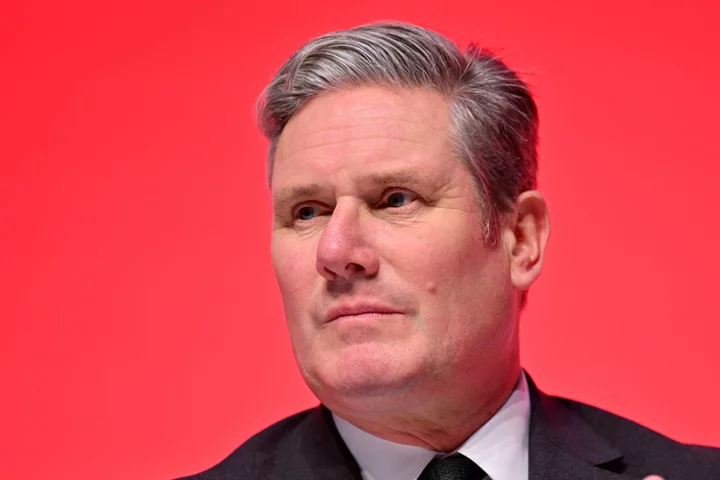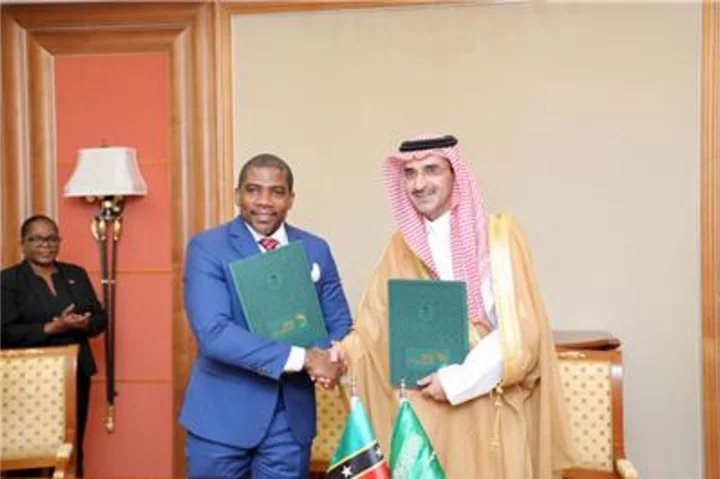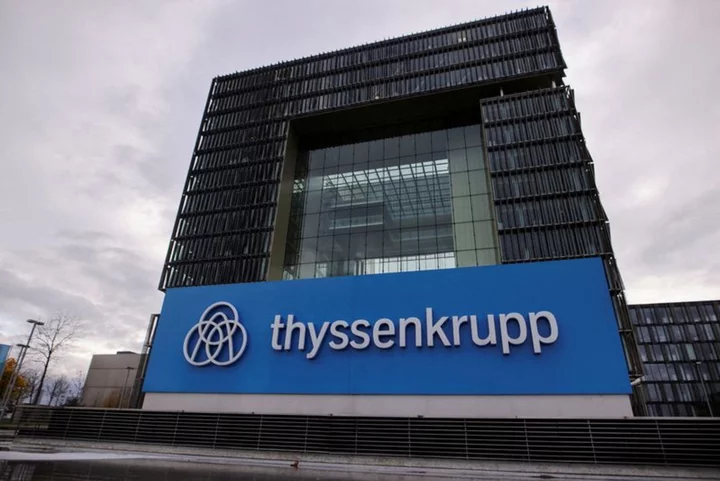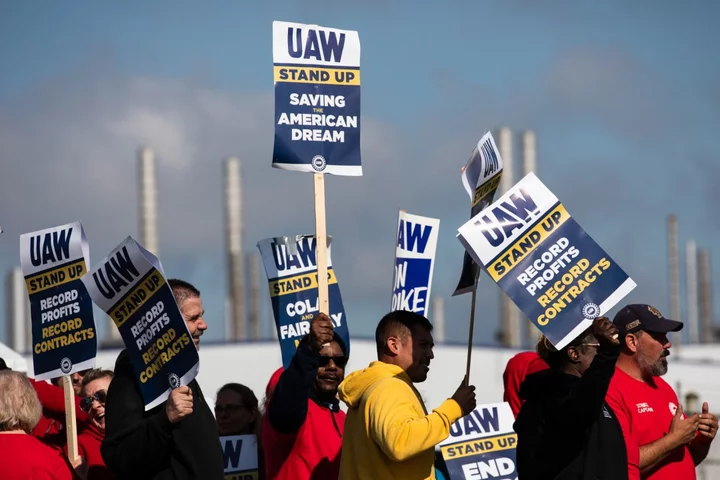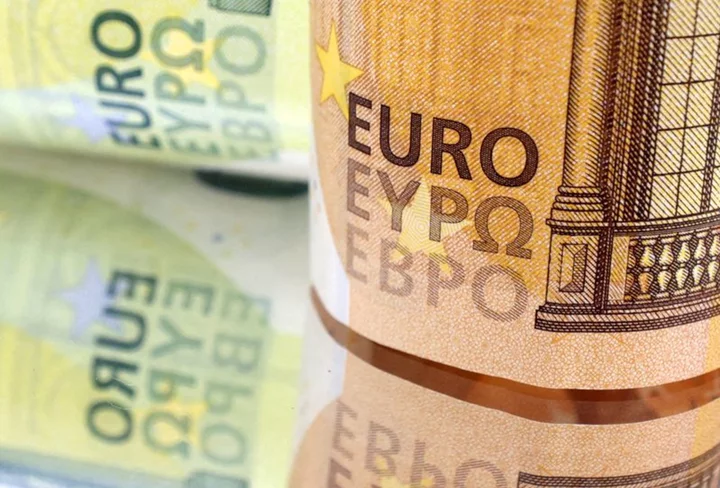Keir Starmer will warn the UK faces a difficult path to recovery as he urges voters to put their trust in his opposition Labour Party to take charge of rebuilding after more then 13 years of Conservative-led governments.
“What is broken can be repaired, what is ruined can be rebuilt,” Starmer will tell Labour’s annual conference on Tuesday, a key moment in his bid to win power in a general election expected next year. Labour will “turn our backs on never-ending Tory decline with a decade of national renewal,” he will say, according to emailed excerpts of his speech.
Labour leads Prime Minister Rishi Sunak’s Conservative Party by about 20 points in national opinion polls, and Starmer’s team has been trying to strike a balance between presenting the opposition as a government-in-waiting while avoiding any missteps that would see the Tories recover momentum.
But there was a marked shift in tone Monday starting with shadow Chancellor of the Exchequer Rachel Reeves, who told a packed conference floor that Labour plans to fight the election on the economy — typically political ground claimed by the Tories — and will prioritize a rebuild of Britain’s ailing infrastructure, including the electricity grid, if it wins power.
The line taps into Labour’s confidence about campaigning on the Tories’ economic record. A recent YouGov poll found the number of people who think the Tories would be better at handling the economy has more than halved since March 2020, to 21% from 47%. The number for Labour almost doubled to 26%.
Starmer is expected to advance the theme on Tuesday, promising to “get Britain building.” According to his office, the Labour leader will also contrast his approach to Sunak’s decision last week to severely scale back the UK’s flagship HS2 high-speed rail line to Manchester.
Sunak used his own keynote speech last week in Manchester to present himself as the real change candidate, despite his party being in power since 2010. But a poll bounce didn’t materialize, and whereas the Tory conference was marked by factional infighting including over calls for tax cuts, Labour’s has been notable for the lack of serious open dissent.
Starmer had faced a potentially destabilizing start to conference, when his left-wing predecessor Jeremy Corbyn repeatedly declined on Sunday to condemn Hamas over its attack on Israel over the weekend.
By Monday, though, it was clear just how far Labour has change on Starmer’s watch, and how his team is controlling what happens. His deputy, Angela Rayner, led a symbolic moment of silence to remember “all the victims” — a moment that would have been hard to imagine under Corbyn.
Starmer was helped last week when Labour stormed to victory in a special election in the suburbs of Glasgow, with a swing from the Scottish National Party that suggested Scotland could be a major help in putting the opposition leader into Downing Street.
Labour’s new Member of Parliament for Rutherglen and Hamilton West, Michael Shanks, gave a speech to the conference on Monday, as did Anas Sarwar, leader of the Scottish wing of the party.
“Let the message from Rutherglen ring out across Britain,” Starmer will say on Tuesday. “Labour serves working people in Scotland because Labour serves working people across all these islands.”
Scotland is an important piece of any return to power for Labour: The party won 41 Scottish seats as recently as 2010 — but after last week’s win now holds just two.
To be sure, there are still activists who want Starmer and Reeves to be more radical — or more left wing — and fear the leadership’s determination to head off Conservative attacks over Labour’s spending plans has resulted in a policy program that lacks ambition.
There was no sign of Reeves being swayed on Monday. Labour will stick to its fiscal rules with “iron discipline,’ she told Bloomberg TV after her speech. “We will invest in the things that will boost our productivity, working in conjunction with business to unlock further private sector investment.”
The reception she got from business was positive. Her speech was standing room-only with large numbers of delegates turned away. While one executive described it as a series of non-statements aimed at not rocking the boat, others said Reeves was persuasive.
“Business senses that Labour is likely going to win,” said Nick DeLuca, senior partner at consulting firm FleishmanHillard. “There’s a comfort with the way Starmer is presenting how Labour will deal with the economy.”
Reeves calls her plan “securonomics,” rebuilding industry to generate jobs and make Britain more self-sufficient. She described the Tories as “the single biggest obstacle to building infrastructure, to investment and to growth.”
“We will fight this election on the economy,” Reeves said.
It’s a pitch aimed at reassuring Britons facing an historic squeeze on living standards. That’s partly why Labour officials say they’re gearing up for an election as soon as May, because the earlier Sunak calls the vote, the fewer voters will have been forced to re-mortgage at higher interest rates.
Starmer said Monday he expects the Tories to “go low” in the election campaign as they try to cling to power. Sunak, he said, will be making short-term decisions to try to create dividing lines. In his speech, the Labour leader will be making the case for a proper change.
“People are looking to us because they want our wounds to heal and we are the healers,” he will say. “People are looking to us because these challenges require a modern state and we are the modernizers. People are looking to us because they want us to build a new Britain and we are the builders.”
--With assistance from Alex Wickham, Eamon Akil Farhat and Kitty Donaldson.
Author: Stuart Biggs, Emily Ashton and Joe Mayes

